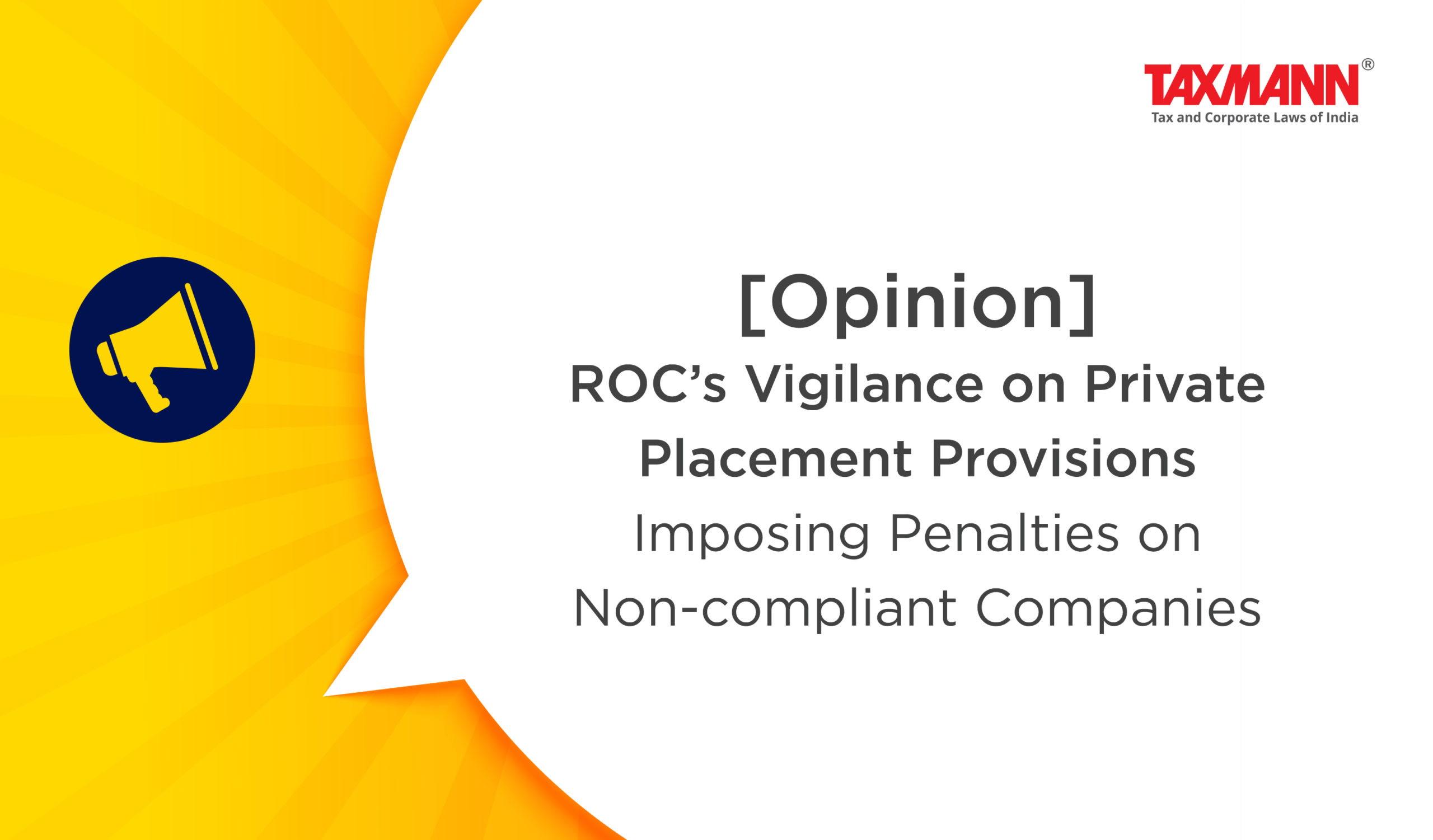[Opinion] ROC’s Vigilance on Private Placement Provisions | Imposing Penalties on Non-compliant Companies
- Blog|News|Company Law|
- 2 Min Read
- By Taxmann
- |
- Last Updated on 15 June, 2023

[2023] 151 taxmann.com 167 (Article)
I. Introduction
There are multiple ways of raising funds: One amongst those is Private Placement.
Whenever a company acquires finance from a specified group of persons against issuance of securities of the company, this corporate action is called private placement. The conditions and compliances relating to the private placement are discussed in section 42 of the Companies Act, 2013 read with rule 14 of the Companies (Prospectus and Allotment of Securities) Rules, 2014.
II. Key provisions relating to Private Placement
Section 42 and the above-referred Rules prescribe that private placement offers for each kind of security shall not be made to more than 200 persons in the aggregate, in one financial year. Also, the procedures like keeping subscription money in separate bank accounts till allotment and utilisation of subscription money only after filing a return of allotment in form PAS-3 are prescribed in section 42 and its Rules.
Section 42(6) states a timeline of 60 days for making allotment after receipt of money. The subsection further states that if allotment of securities is not done within the prescribed time, the money must be returned to the applicant within 15 days from the end of 60 days and if the money is not so returned, then interest must be paid on such money. Further after completion of these 15 days, the application money received will be considered as deposits accepted by the Company,
Since section 42 deals with a very crucial corporate action, the consequences of non-compliance with this section are also serious. Subsections 9 & 10 of section 42 prescribe penalties for non-compliance with any provisions of section 42 and subsection 11 states that private placement issues not made in contravention of section 42(2), i.e., if made to more than 200 persons in the aggregate, in one financial year, it shall be considered as a public issue of securities and SEBI regulations shall become applicable to such issue.
Subsection 10 of section 42 prescribes that, if the company accepts money in contravention of section 42, then the company and its directors shall be liable to a penalty that may extend a maximum of up to RS. 2 Crores and the company is required to refund all the money received against the allotment of securities.
III. Precedents
Companies doing private placement and not complying with all the applicable provisions of private placement have been facing flak from ROC. ROCs have been adjudicating this matter for a while now. Recently, a company had to face harsh consequences due to non-compliance with section 42 was seen in the latest adjudication order passed by ROC Mumbai on 1st May 2023. In this order, ROC imposed a heavy penalty on the company and ordered a refund of allotment money along with interest.
Click Here To Read The Full Article
Disclaimer: The content/information published on the website is only for general information of the user and shall not be construed as legal advice. While the Taxmann has exercised reasonable efforts to ensure the veracity of information/content published, Taxmann shall be under no liability in any manner whatsoever for incorrect information, if any.

Taxmann Publications has a dedicated in-house Research & Editorial Team. This team consists of a team of Chartered Accountants, Company Secretaries, and Lawyers. This team works under the guidance and supervision of editor-in-chief Mr Rakesh Bhargava.
The Research and Editorial Team is responsible for developing reliable and accurate content for the readers. The team follows the six-sigma approach to achieve the benchmark of zero error in its publications and research platforms. The team ensures that the following publication guidelines are thoroughly followed while developing the content:
- The statutory material is obtained only from the authorized and reliable sources
- All the latest developments in the judicial and legislative fields are covered
- Prepare the analytical write-ups on current, controversial, and important issues to help the readers to understand the concept and its implications
- Every content published by Taxmann is complete, accurate and lucid
- All evidence-based statements are supported with proper reference to Section, Circular No., Notification No. or citations
- The golden rules of grammar, style and consistency are thoroughly followed
- Font and size that’s easy to read and remain consistent across all imprint and digital publications are applied



 CA | CS | CMA
CA | CS | CMA
